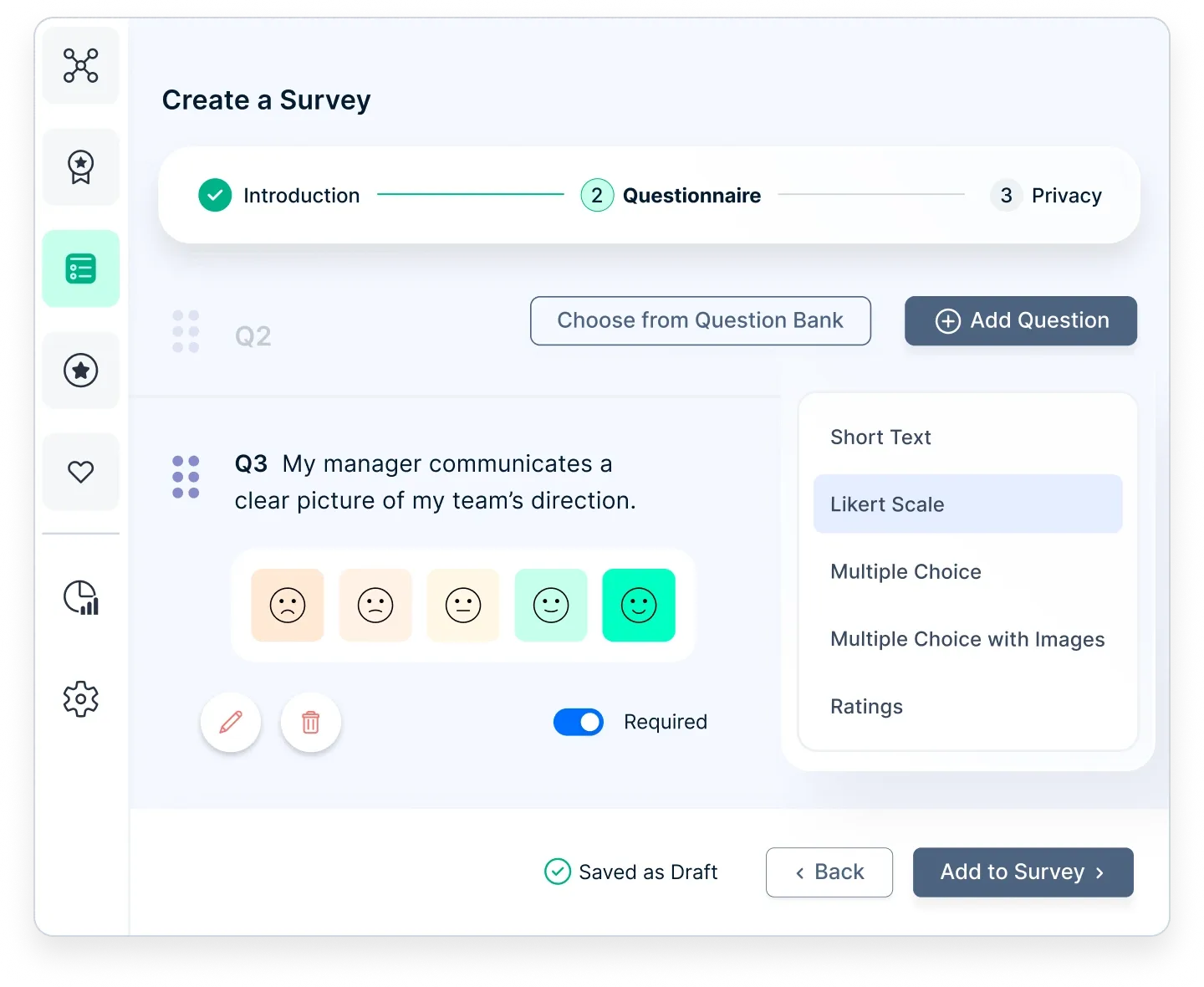Why Your High Potential Employees Leave & Tips to Retain Them
High-potential employees drive business success, but when they leave, companies face costly disruptions. Lack of growth opportunities, poor recognition, and disengagement push top performers toward better offers.
On this page
While 16% of Gen Z and Millennial employees left a job because of inadequate technology, many left the workplace due to inhabitable culture. Losing employees to turnover is never good - but it’s excruciating when one of your top performers decides to leave. Retaining top talent is vital for your team's and your business's success. But it’s increasingly difficult to do so these days.
According to a recent survey of 2,500 U.S. workers, nearly half plan to look for a job in 2023—including 60% of Gen Z workers and 56% of millennials.
Why do high potential employees leave? Why are so many top performers so unhappy in their current roles? If you don’t know why they’re leaving, you’re already behind in the battle to get them to stay.
5 Signs a top performer is leaving
Losing a high-performing employee can disrupt workflows, impact team morale, and create costly hiring challenges. While some resignations come as a surprise, there are often warning signs before a top performer decides to leave. Recognizing these signals early allows businesses to retain their best talent proactively.
1. Decreased engagement and enthusiasm
Top performers are usually passionate about their work, taking initiative and driving results. A sudden drop in enthusiasm—less participation in meetings, avoiding extra responsibilities, or showing disinterest in company goals—can indicate disengagement. Employees who stop contributing ideas or seem indifferent to feedback may already be mentally checked out.
Reignite motivation with Empuls. Get started today!
2. Lower productivity and missed deadlines
High achievers are known for exceeding expectations. If their output drops, they procrastinate more than usual, or they start missing deadlines, it could signal a shift in priorities. This often happens when employees begin to detach emotionally from their role or focus their energy on job hunting.
3. Increased absences or frequent breaks
A noticeable change in attendance—more sick days, extended lunch breaks, or sudden requests for time off—can be a red flag. While occasional absences are normal, a consistent pattern may indicate that they’re attending interviews, networking, or simply disengaging from their current role.
4. Lack of interest in long-term projects
When an employee avoids committing to future initiatives or leadership roles they would typically embrace, it’s a sign they don’t see themselves staying. If they seem uninterested in career development conversations or dismiss discussions about future goals, they may already have one foot out the door.
5. Changes in attitude and communication
A top performer who once engaged in open discussions may become distant, less responsive, or even frustrated with leadership and colleagues. If they stop contributing to team conversations, withdraw from social interactions, or voice dissatisfaction with company policies, they might be considering an exit.

Give Your Best Employees a Reason to Stay
Salary alone isn’t enough. Empuls creates an environment where employees feel valued, heard, and supported—ensuring your high-potential talent stays and grows with you.
Reasons why your high potential employees leave
Let’s look at the six simple reasons why your best employees quit.
1. You’re not meeting their expectations for benefits
Your top performers value merit-based rewards and good compensation - that’s not so different from most employees. But they also know that they have the skills to get those needs met elsewhere if your company isn’t providing enough.
The SAP-Oxford study found that high performers valued certain benefits highly:
- Flexible schedules
- Vacation time
- Retirement plans
- Training
If you’re not providing a wide range of benefits that reward your highest-performing employees, they’re likely to look elsewhere for them. And they’re likely to find a good enough offer to tempt them to leave. This is the number one reason that good employees quit.
And if you’re hoping you can squeeze a few more years out of high performers with highly creative rewards because you don’t have the budget to pay them what they’re worth?
For example, American Express offers flexible working arrangements to some employees, like top performers, to work on their schedule. And Salesforce offers extensive continued training and leadership development opportunities to build their internal talent teams and keep top employees.
2. They don’t find work engaging enough
You might make the mistake of thinking that your top performers are engaged because they’re so productive and hard-working - how could they do all they do if they aren’t highly engaged?
But the truth is, they might be less engaged than you assume. And if you’re not making real efforts to engage them, that’s probably the case.
Why is it vital to engage high performers? Because their biggest enemy is boredom.
- If they’re excelling at the job far beyond what anyone else on the team is doing, they might eventually get bored of doing the same tasks.
- Or, if they’re surrounded by a stagnant work environment (or worse, a team full of underperformers), they can start to feel stuck and look around for another role on a team that’s more at their level.
Don’t forget to look at their managers to see if that’s a negative engagement factor. Behavioral statistician Joseph Folkman noted that employees who work for uninspiring and flawed leaders are only in the 9th percentile for satisfaction and happiness.
If your top performers are stuck with lousy managers and your organization doesn’t do anything about it, they’re going to be disengaged and starting a job search.
You can engage high performers by giving them more challenging and creative tasks and focusing on the “why.” That helps keep things fresh and exciting and prevents them from jumping ship to a more exciting shop.
3. Their career development is limited
Your top performers know that they have plenty of exciting potential in their careers ahead of them if they’re at the right company.
Very little is more frustrating to someone performing at their peak and making outsized contributions to the company than repeatedly being passed over for promotions or languishing in the same role too long.
Another reason why good employees leave is if your best people don’t see how they can have a long and successful career at your company, they will be out the door in no time - because that’s a very discouraging feeling.
Are you noticing that there are few promotions for the top performers? This is what Forbes calls “the curse of competence.”
There are a few reasons for this - sometimes it’s just a matter of not enough spots at the top, but sometimes managers are reluctant to let the highest-talent people move on to a new position.
They’re afraid to lose someone making huge contributions to their department - but guess what? If you hold them back and don’t promote them, they will leave, and now they’ll leave the company as well as the manager behind.
How can you help them progress in their career at your company?
- It is vital to have regular career development discussions with them where you talk about their goals and how they can achieve them at your business.
- Ongoing training is also highly valued by top performers - are you providing them with the opportunity to develop new skills?
- If you have seen a pattern of high-performing employees leaving because of career path frustration, this is a place for your senior team to figure out how you can make room for growth for the people you want to keep.
4. They’re overworked and burnt out
If the reward for your best people being incredibly productive is to heap more and more work on their plate, that’s a recipe for dissatisfaction and burnout.
How are you rewarding this higher productivity in your top workers?
- You should have options for compensation that acknowledge their contributions go above and beyond.
- You should also look into flexible work options for them, so when they do an excellent job, they can have the option to take time off to recharge and relax. Raytheon offers compressed workweeks, job sharing, flextime, telecommuting, and more to attract and retain top employees.
Rewarding top performers adequately can be difficult in tighter financial times. However, SHRM found that it’s still vital, and there are ways to make it work - carve out a separate bonus or raise pool for top performers, give an additional merit raise in a year, or give a one-time lump-sum bonus.
Sure, it costs time and money to do this - but how much of both will your business lose if another high performer leaves?
5. They don’t have enough autonomy
Top performers know they’re good at their jobs. They know they’re highly productive, they know they possess valuable skills, and they know they can be trusted to do their work on time and do it well. That’s why they really don’t like feeling micromanaged.
From your best to the not-so-great, all employees want to feel a sense of autonomy and purpose at work. And if anyone has earned the right to that, your high performers certainly have.
They don’t need someone hovering and getting in the way - they want to be trusted to do the work well and feel a sense of ownership, no obligation.
So how should you treat these valuable top performers?
- Tell them what needs to be done and trust them to do it.
- That can mean even giving them the option of a flexible schedule that’s not available to other employees - because, with your top people, you already know they’ll get their tasks done on time and with excellence.
Give them your trust, and you’ll get their loyalty. For example, Ritz-Carlton offers each employee the option to delight guests at the cost of up to $2,000 per day, with complete autonomy.
This boosts employee satisfaction, as well as customer loyalty. This goes for their work schedules, too - top performers highly value flexibility in when and how they work.
The Boston College Center for Work & Family says that workers who have more access to flexible work arrangements report greater job satisfaction, significantly better mental health than other employees, and are more likely to be committed to their employers.
6. They don’t feel valued
Everybody wants to feel valued and appreciated at work - it’s a basic human need, and it’s why recognition is so vital in the workplace. And it’s especially easy to take what your top performers do for granted when they’ve been doing it for a long time - and making even hard tasks look easy.
This is one of the main reasons that good employees quit. If the only reward your top performers get for going above and beyond is getting more and more work piled on their plate - that’s not a reward. They don’t feel valued - they feel taken advantage of and unmotivated.
So how do you recognize your top performers? A yearly bonus isn’t going to cut it - recognition needs to be frequent and specific (and sometimes small) to make an impact.
If you only reward employees based on their tenure at your company or have a pay structure based on role, not the outcome, top performers will feel overlooked and undervalued. And then they’re going to leave.
5 Tips to retain high-potential employees
High-potential employees bring innovation, leadership, and long-term value to an organization. Losing them not only disrupts workflows but also creates recruitment and training costs that could have been avoided. Retaining top talent requires a proactive approach that keeps them motivated, challenged, and invested in the company's future. Here’s how businesses can create an environment that encourages high-potential employees to stay and grow.
1. Offer clear career growth paths
High-potential employees are driven by ambition and want to see a future within the company. Without clear career progression, they may look for opportunities elsewhere. Providing structured career paths, mentorship programs, and leadership training helps them visualize long-term growth.
Regular career discussions, skill development programs, and internal promotions ensure employees see a roadmap for success. Knowing their hard work leads to new opportunities makes them more likely to stay engaged and committed.
2. Recognize and reward performance
Recognition plays a significant role in retention. When employees feel their efforts go unnoticed, motivation fades. Implementing structured rewards and recognition programs like Empuls helps businesses appreciate and celebrate top performers in meaningful ways.
Recognition doesn’t always have to be monetary. Public appreciation, peer-to-peer recognition, and career advancement opportunities reinforce a culture of acknowledgment. Whether through bonuses, promotions, or even small but thoughtful rewards, employees who feel valued remain loyal to the organization.
3. Provide challenging and meaningful work
High-potential employees seek challenges that allow them to use their skills, think critically, and make an impact. Repetitive, uninspiring tasks lead to disengagement, while meaningful projects keep them motivated.
Encourage them to take ownership of projects, participate in decision-making, and contribute ideas that shape business strategy. Giving them autonomy over their work while ensuring it aligns with their career goals boosts both engagement and productivity. Employees who feel their contributions matter are more likely to stay invested in the company’s success.
4. Foster a positive workplace culture
A workplace where employees feel supported, connected, and included fosters long-term commitment. Positive work environments encourage collaboration, open communication, and a sense of belonging.
Encourage social interactions and team bonding through platforms like Empuls’ social intranet software, where employees can engage, celebrate milestones, and stay connected—even in hybrid or remote settings. When employees feel emotionally connected to their workplace, they are less likely to seek external opportunities.
5. Support work-life balance
Burnout is a major cause of turnover, especially among high-potential employees who take on more responsibilities. A work culture that prioritizes well-being keeps employees refreshed, motivated, and productive in the long run.
Encourage flexible work arrangements, mental health initiatives, and reasonable workloads to prevent burnout. Offering benefits such as wellness stipends, paid time off, and remote work options shows employees that their well-being is valued. A company that respects work-life balance retains employees who feel energized and committed.
Retaining high-potential employees requires more than just a paycheck. Career growth, meaningful recognition, challenging work, a strong workplace culture, and work-life balance create an environment where top talent thrives. Platforms like Empuls help businesses implement structured engagement strategies, ensuring employees stay motivated, committed, and eager to contribute to long-term success.
Retaining your best talent with Empuls

High-potential employees leave when they feel undervalued, unchallenged, or disconnected. A competitive salary alone won’t keep them—the culture, recognition, and growth opportunities matter. This is where Empuls steps in.
- Make recognition a habit: Top performers thrive on appreciation. Empuls ensures consistent and meaningful recognition, reinforcing their value and contributions.
- Offer meaningful rewards: A generic bonus won’t cut it. Empuls provides personalized rewards that align with employees’ preferences, making them feel truly appreciated.
- Give them a voice: Employees who feel unheard start looking elsewhere. Empuls’ survey tool captures real feedback, helping leaders address concerns before they turn into resignations.
- Build a connected culture: Disengagement is often rooted in isolation. Empuls’ social intranet fosters collaboration, keeping employees engaged with their teams and company vision.
- Enhance their well-being: Burnout drives top talent away. Empuls provides tax-free fringe benefits and wellness perks that help employees feel supported in every aspect of their lives.
Losing high-potential employees is costly but retaining them is simple with the right tools. Empuls helps create an environment where your best talent feels valued, heard, and motivated to stay.
Conclusion
High potential employees leave when they feel undervalued, stagnant, or overworked. Lack of career growth, poor recognition, and a weak workplace culture drive them toward better opportunities. Addressing these issues early—through meaningful recognition, career development, and work-life balance—helps businesses retain top talent.
Investing in engagement strategies with Empuls can create a workplace where high-potential employees feel valued, motivated, and committed for the long run.


















